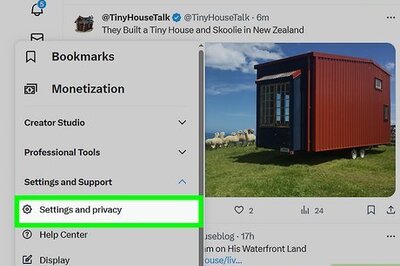
views
Sensex Today: Benchmark indices ended lower on October 9 with Nifty around 19,500 amid selling across the sectors.
At close, the Sensex was down 483.24 points or 0.73 percent at 65,512.39, and the Nifty was down 141.20 points or 0.72 percent at 19,512.30. About 970 shares advanced, 2699 shares declined, and 129 shares unchanged.
Equity markets reeled under selling pressure on Monday as geopolitical developments between Israel and Hamas group soured sentiment. Oil prices surged by up to 8 per cent in two days, stoking fears of elevated inflation across the globe.
Volatility gauge, India VIX, zoomed 12 per cent today.
Adani Ports, Hero MotoCorp, HDFC Life, M&M, BPCL, Bajaj Finance, SBI, Tata Steel, Kotak Bank, Asian Paints, HDFC Bank, Adani Enterprises, and Titan Company declined between 1 per cent and 5 per cent today.
The pain, meanwhile, was severe in the broader market with the BSE MidCap and Smallcap indices shedding 1.2 per cent and 1.7 per cent, respectively.
Among sectors, all the indices settled lower led by the Nifty PSU Bank index (down over 3 per cent), followed by the Nifty Media index (2.4 per cent).
Dr. V K Vijayakumar, Chief Investment Strategist at Geojit Financial Services, “The Israel-Hamas conflict has introduced a huge uncertainty for the markets. Nobody knows how this war is going to evolve. From the market perspective it is important to understand that even though the death and destruction are tragic, presently it is unlikely to cause major disruption in oil supplies thereby impacting major oil importers like India. But the situation will change if Iran, a major Hamas supporter, is drawn into the war. That can disrupt oil supplies causing a spike in crude, which can trigger a risk-off in the market.”
“The Israel-Hamas conflict has introduced a huge uncertainty for the markets. Nobody knows how this war is going to evolve. From the market perspective it is important to understand that even though the death and destruction are tragic, presently it is unlikely to cause major disruption in oil supplies thereby impacting major oil importers like India. But the situation will change if Iran, a major Hamas supporter, is drawn into the war. That can disrupt oil supplies causing a spike in crude, which can trigger a risk-off in the market.”
Markets Tank After Middle East Conflict Escalates
Santosh Meena, Head of Research, Swastika Investmart, said: “the ongoing conflict in Israel is an unforeseen event impacting the market, and its effects may take some time to be fully absorbed. Monitoring the situation closely, especially regarding potential involvement of other actors like Iran, is essential. The possibility of a third front involving Iran is a significant concern as it could trigger a sharp increase in crude oil prices.”
“From a technical standpoint, the 19300–19250 range is a critical demand zone. Until the market stabilizes within this range, it’s likely to remain in a sideways pattern, facing a notable obstacle at 19800. A breach below 19250 could lead to a healthy correction, potentially reaching the 18800 level. For short-term traders, it’s advisable to exercise caution and not rush into trades. On the other hand, a substantial correction could present an excellent buying opportunity for long-term investors,” he added.
Global Cues
The Hong Kong stock exchange delayed trading in both the securities and derivatives markets on Monday morning due to Typhoon Koinu.
The Hong Kong Observatory said storm signal No. 8, would remain in force before 11 am (0300 GMT) while the Rainstorm Warning Signal was now Black, meaning heavy rain has fallen or is expected to fall generally over the city and is likely to continue.
The safe-haven dollar and Japanese yen edged higher on Monday as violence in the Middle East spooked markets, while a blowout U.S. jobs report gave the greenback a further leg up.
US stock futures slid in Asia on Monday as the military conflict in the Middle East boosted oil and Treasuries, while the sizzling September U.S. jobs report raised the rate stakes for inflation figures later in the week.


















Comments
0 comment